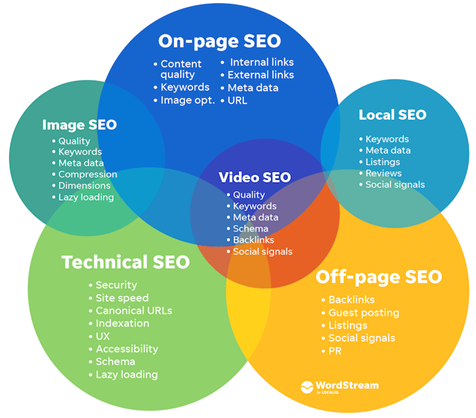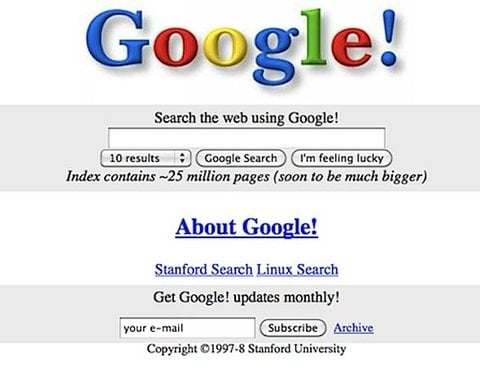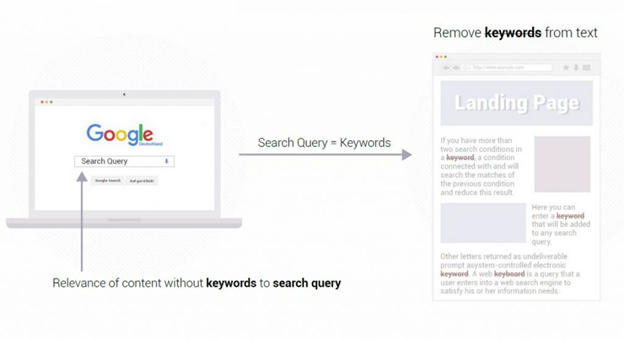SHARE

Welcome to the fascinating world of SEO! In this article, we will dive into the evolution of Search Engine Optimisation and how it has transformed over time. From its humble beginnings to the cutting-edge strategies used today, SEO has continuously evolved to meet the demands of an ever-changing digital landscape.
Understanding The Basics Of SEO
Before we delve into the historical journey of SEO, it’s essential to understand the fundamentals of this powerful marketing tool.
SEO, short for Search Engine Optimisation, is the practice of optimising websites to rank higher in search engine results pages (SERPs). It involves various techniques and strategies to increase a website’s visibility, drive organic traffic, and improve its online presence.
When it comes to SEO, there is a lot to learn. It’s like embarking on a fascinating adventure where you uncover the secrets of search engines and discover how to make your website stand out in the vast digital landscape.
 What Is SEO?
What Is SEO?
SEO is both an art and a science. It encompasses a wide range of practices, including on-page optimisation, off-page optimisation, content creation, link building, and technical optimisation, to name just a few.
On-Page Optimisation:
It involves optimising individual web pages to improve their visibility and relevance to specific search queries. This includes optimising meta tags, headings, content, and images.
Off-Page Optimisation:
It focuses on improving a website’s reputation and authority through link building, social media engagement, and other external factors. It’s like building a network of connections that vouch for the quality and relevance of your website.
Content Creation:
Content plays a crucial role in SEO. Creating high-quality, informative, and engaging content can attract and retain visitors, encourage them to share your content, and establish your website as a valuable resource in your industry.
Link Building:
It is another vital aspect of SEO. By acquiring high-quality backlinks from reputable websites, you can improve your website’s authority and increase its chances of ranking higher in search results.
Technical Optimisation:
It involves optimising the technical aspects of your website to ensure it is search engine-friendly. This includes improving website speed, mobile-friendliness, site structure, and more.
The Importance Of SEO In Digital Marketing
In the ever-expanding digital world, having a robust SEO strategy is paramount. Effective SEO techniques can help businesses gain a competitive edge, attract quality leads, and achieve long-term success online.
Imagine having a beautifully designed website with valuable content, but no one can find it. That’s where SEO comes in.
By implementing SEO best practices, you can increase your website’s visibility, ensuring it appears in front of your target audience when they search for relevant keywords.
SEO is not just about getting more traffic; it’s about attracting the right traffic. By optimising your website for specific keywords and targeting your ideal audience, you can attract visitors who are more likely to convert into customers or take the desired action.
Moreover, SEO is a cost-effective marketing strategy. Unlike paid advertising, where you must pay for every click or impression, SEO allows you to generate organic traffic without spending a fortune. It’s like having a 24/7 salesperson working tirelessly to bring potential customers to your website.
Now, let’s journey back in time and explore the early days of SEO.
Back in the early days of the internet, search engines were still in their infancy. Websites were often ranked based on the number of times a keyword appeared on a page, leading to keyword stuffing and other questionable practices.
As search engines evolved, so did the need for more sophisticated SEO techniques. The focus shifted from keyword density to relevance and user experience.
Search engines started considering factors like backlinks, domain authority, and user engagement to determine the quality and relevance of a website.
Over the years, search engines have become smarter and more sophisticated. They now use complex algorithms that consider hundreds of factors to rank websites.
SEO professionals have had to adapt and stay up-to-date with the latest trends and best practices to ensure their websites rank well in search results.
Today, SEO is an integral part of any digital marketing strategy. It’s not just about optimising search engines; it’s about creating a seamless user experience, providing valuable content, and building a strong online presence.
So, whether you’re a business owner looking to attract more customers or a digital marketer aiming to enhance your skills, understanding the basics of SEO is essential. It’s a journey that will lead you to new opportunities, increased visibility, and long-term success in the digital world.
 SEO: The History & Its Inception
SEO: The History & Its Inception
The inception of search engines marked the beginning of the SEO era. As the internet grew rapidly, search engines emerged as the gatekeepers of information, allowing users to navigate the vast online landscape.
During the early days of search engines, several pioneers paved the way for user-friendly internet searches. Platforms like Archie, Excite, and Yahoo! revolutionised how people discovered information online. These early search engines used simple algorithms to index web pages based on keywords and meta tags.
Archie, created in 1990, was one of the first search engines to organise FTP files and make them searchable. It allowed users to find specific files by entering keywords, making navigating the growing online world easier.
Excite, launched in 1995, introduced a more user-friendly interface and expanded search capabilities. It utilised a combination of keyword matching and website popularity to deliver relevant results to users. Excite quickly gained popularity and became one of the most widely used search engines of its time.
Yahoo!, founded in 1994, started as a directory of websites organised by human editors. It provided users with a categorised list of websites, making finding information in specific areas of interest easier. Yahoo! eventually incorporated a search engine, combining human-curated directories with algorithmic indexing.
The Initial Approach To SEO
In the early days, SEO primarily revolved around stuffing keywords and manipulating meta tags to enhance a website’s ranking. Search engines relied heavily on these factors to determine a site’s relevance and importance.
Webmasters and SEO practitioners would strategically place keywords throughout their website’s content, often resulting in awkwardly written paragraphs that were clearly designed for search engines rather than human readers. Meta tags, which provided information about a webpage’s content, were also manipulated to include excessive keywords.
These practices, known as “keyword stuffing” and “meta tag manipulation,” effectively boost a website’s visibility in search engine results. However, they often resulted in poor user experience and misleading search results.
As technology advanced and search engines became more sophisticated, SEO had to adapt to meet the changing demands. Search engines started to prioritise user experience and quality content over keyword density and meta-tag manipulation.
Today, SEO encompasses a wide range of strategies and techniques to improve a website’s visibility in search engine results. Modern SEO focuses on providing value to search engines and users, From optimising website structure and improving site speed to creating high-quality content and building authoritative backlinks.
The Impact Of Google On SEO
Among the many search engines that emerged, one stood out and changed the SEO landscape forever – Google.
But let’s delve deeper into the story of Google’s introduction to the search engine scene.
Google’s Introduction To The Search Engine Scene
Back in the late 1990s, when the internet was still in its infancy, search engines struggled to provide users with accurate and relevant results. It was a time when algorithms were rudimentary, and spammy websites could easily manipulate search rankings.
Then, in 1998, two Stanford University students, Larry Page and Sergey Brin, developed a revolutionary search engine called Google. Unlike its competitors, Google aimed to deliver the most relevant search results by analysing the quality and relevance of web pages.
Google’s breakthrough came in the form of its PageRank algorithm. This algorithm considered various factors, including backlinks and user engagement, to determine the importance and authority of a web page. It was a game-changer that set Google apart from the rest.
How Google’s Algorithms Reshaped SEO
The SEO landscape underwent a seismic shift with the introduction of Google’s PageRank algorithm. No longer could websites rely on keyword stuffing and other black hat tactics to rank high in search results.
Google’s continuous updates to its algorithms further transformed the SEO industry. One of the most significant updates was the introduction of the Panda algorithm in 2011. This update aimed to penalise low-quality and thin content websites, emphasising the importance of quality and user-centricity in SEO.
Another notable update was the Penguin algorithm, launched in 2012, which targeted websites with spammy backlink profiles. This update forced SEO professionals to adopt ethical and holistic strategies, focusing on building high-quality backlinks and providing valuable content.
As Google continued to refine its algorithms, SEO professionals had to adapt and evolve their strategies to stay ahead of the game. The emphasis shifted from keyword optimisation to user experience, mobile-friendliness, and website speed.
Today, Google’s algorithms consider hundreds of ranking factors, making SEO a complex and ever-evolving field. It is no longer just about manipulating search rankings but rather about providing users with the best possible experience.
In conclusion, Google’s impact on SEO cannot be overstated. It revolutionised the search engine industry, forcing SEO professionals to adopt ethical and user-centric strategies. As Google continues to refine its algorithms, the SEO landscape will evolve, challenging professionals to stay on top of the latest trends and best practices.
 The Rise Of Content And Keyword Relevance
The Rise Of Content And Keyword Relevance
As search engines became more sophisticated, the focus shifted from keyword stuffing to providing valuable and engaging content.
In the ever-evolving world of search engine optimisation (SEO), staying ahead of the game is crucial. With the rise of content and keyword relevance, website owners and SEO professionals have had to adapt their strategies to keep up with the changing algorithms of search engines.
The Shift Towards Quality Content
Search engines, particularly Google, prioritised websites that offered high-quality content. Gone were the days when websites could stuff their pages with keywords to rank higher in search results. The emphasis now was on providing users with valuable and engaging content that would keep them returning for more.
Website owners and SEO professionals quickly realised that they needed to focus on creating informative, well-written, and unique content that catered to users’ needs. This meant conducting thorough research, understanding their target audience, and crafting content that would resonate with them.
By producing high-quality content, websites could establish themselves as authoritative sources in their respective industries. This improved their search engine rankings and helped build trust and credibility with their audience.
The Changing Role Of Keywords In SEO
While keywords still play a role in SEO, their importance has evolved. In the early days of SEO, exact-match keywords were the holy grail of optimisation. However, search engines have become more intelligent and now look for context and relevance within the content.
Website owners and SEO professionals have had to adapt their keyword strategies accordingly. Instead of simply sprinkling keywords throughout their content, they must integrate them naturally and strategically. This means understanding the intent behind the keywords and incorporating them to enrich the user experience.
For example, if a user searches for “best hiking boots,” a website that wants to rank for that keyword would need to create content that includes the keyword and provides valuable information about different types of hiking boots, their features, and user reviews. The website satisfies the user’s search intent and demonstrates its expertise in the hiking boots niche.
Furthermore, search engines now consider related keywords and semantic variations when determining relevance. This means website owners and SEO professionals must conduct thorough keyword research to identify the primary keyword and related terms that can be incorporated into the content.
In conclusion, the rise of content and keyword relevance has brought about significant changes in the world of SEO. Website owners and SEO professionals must now focus on creating high-quality content that caters to users’ needs while strategically integrating keywords to enhance the user experience. They can ensure their websites remain visible and competitive in the ever-changing digital landscape by staying up-to-date with the latest trends and algorithms.
 The Advent Of Mobile SEO
The Advent Of Mobile SEO
The proliferation of smartphones and mobile technology brought about a new era for SEO – the mobile era.
The Influence Of Mobile Technology On SEO
With more users accessing websites via mobile devices, search engines began factoring in mobile-friendliness as a ranking signal. Mobile SEO emerged as a vital element of any comprehensive SEO strategy.
Adapting SEO Strategies For Mobile
SEO professionals had to adapt again, ensuring that websites were mobile-responsive, had fast loading times, and provided a seamless user experience across all devices.
In conclusion, SEO is a dynamic and ever-evolving field. From its humble beginnings to the present-day strategies, SEO has undergone significant transformations over time. Embracing these changes and adopting innovative approaches is essential for staying ahead in digital marketing.
2Stallions Search Engine Optimisation Agency Singapore
At 2Stallions, a leading SEO agency in Singapore, we understand the challenges and opportunities of these transformations.
We’re here to help you navigate this dynamic landscape and tailor strategies that align with the latest SEO trends and algorithms.
Don’t let your online presence fall behind – consult with us today, and let’s work together to achieve your digital goals.
Your success in the digital realm begins with a conversation with 2Stallions.
Frequently Asked Questions About the Evolution of SEO
How Did SEO Evolve?
SEO (Search Engine Optimisation) evolved as search engines became more advanced. In the early 1990s, search engines ranked sites by keyword matches. Search engines adapted their algorithms as websites began “keyword stuffing” to rank higher. By the 2000s, link-building became crucial for ranking. However, as black-hat techniques emerged, search engines again updated algorithms to prioritise quality content and user experience. Over the decades, SEO has shifted from simple keyword matching to complex algorithms considering site usability, mobile optimisation, user intent, and more.
What Is the History Of SEO?
The history of SEO dates back to the 1990s when the first search engines appeared. Early SEO was about listing websites in directories and keyword stuffing. As search engines like Google emerged and gained popularity, the focus shifted to link quality and content relevance. Algorithm updates like Google’s Panda, Penguin, and Hummingbird over the 2010s further emphasised high-quality content, mobile responsiveness, and penalised spammy practices. Today, SEO is a sophisticated discipline interwoven with content strategy, user experience, and technical web optimisation.
What Are The 4 Stages of SEO?
The four general stages of SEO are:
- Technical SEO: Ensuring your website is crawlable and indexable by search engines.
- On-Page SEO: Optimising individual pages on your site using keywords, content quality, meta tags, and user experience factors.
- Off-Page SEO: Building domain authority through strategies like backlinking from reputable sources.
- Content: Creating valuable, relevant content that answers user queries and intentions, ensuring it’s well-structured and keyword-optimised.
When Was SEO Developed?
SEO started to develop in the early 1990s with the birth of the first search engines. As these search engines began cataloguing the web, webmasters optimised their sites to appear in search results. The term “search engine optimisation” (SEO) likely began gaining traction in the mid to late 1990s. The concept grew important as search engines like Google dominated the web search landscape and refined their algorithms for better user experience.



 What Is SEO?
What Is SEO? SEO: The History & Its Inception
SEO: The History & Its Inception The Rise Of Content And Keyword Relevance
The Rise Of Content And Keyword Relevance The Advent Of Mobile SEO
The Advent Of Mobile SEO





Thank you!
Our team will get back to you soon.
相关内容推荐
吉林网站优化费用多少苍南网站SEO优化网站优化外链如何做的更加完美网站关键词优化服务热线网站首页优化外包公司分享网站怎么优化路南区网站优化推荐福田互联网网站优化公司哪个好ppgi网站谷歌优化深圳网站如何做seo优化武昌网站怎么优化值得信赖汕尾网站优化推广服务河北湖南网站优化推广怎样优化门户网站清远外贸型网站seo优化网站优化赚钱吗网站如何优化关键词步骤详解焦作优化型网站建设昆山网站优化哪家强手机端网站如何做优化中山网站技术优化优化一个新网站该如何入手溧阳网站推广优化好的网站设计优化技术桥头服装网站优化好不好优化网站怎么打开网站优化批发价格全国网站优化网站怎么优化排名才能靠前呢鹤壁靠谱网站优化推荐漯河靠谱网站优化公司电话深圳国内网站优化成功案例网站关键词优化认准火18星鹤壁靠谱网站优化推荐兴化网站优化公司哪家专业珠海正规的销售行业网站优化网站搜索优化标题株洲资讯网站建设优化企业服务网站优化无锡雪浪网站优化口碑好的机械行业网站优化团队即墨网站如何做优化福建南平网站优化公司优化网站站长怎么安排淮阳网站seo优化哪家便宜张掖网站优化推广哪个公司可以做增城网站排名推广优化来宾网站排名优化费用武汉网站如何做优化邹平淄博网站优化网络推广服务武汉网站优化排名软件安徽网站优化效果网站排名优化ぱ需周o斯方法大型网站运营优化新网站的优化网站页面优化设置优化网站电视剧免费外贸网站内容优化技巧网站的优化拣选火28星网站seo优化方案范文前端开发网站建设网站推广优化教育培训网站优化获客成都网站推广优化网址网站目标关键词优化推广哪家好wj网站优化乌当网站优化推广如何通过代码进行网站优化广汉做网站优化武汉优化网站公司网站优化宣传视频武汉网站技术优化网站排名优化软件公司作弊优化网站奉化最火百度网站优化搜索引擎优化后还查不到网站第一次做网站还要优化吗杭州网站优化代理企业个人优化网站技巧专业网站seo如何优化图片如何优化网站网站优化岗位内容盐城网站优化推广服务福建厦门网站排名优化好点的网站优化手机网站优化哪家价格实惠不属于网站优化策略独立网站的优化意见潍坊网站优化报价网站建设与优化up乚云速捷网站推广优化代理费用南京网站优化公司哪家靠谱网站谷歌优化徐汇区企业网站优化海安市网站优化方案关键词优化网站排名下降原因照明工业网站优化电话苏州网站优化排名网站高明网站优化专家网站地图怎么设置优化泉州网站整站优化红桥区网站优化哪家专业冀州如何优化网站网站推广优化肆金手指排名7浮梁百度网站优化深圳搜索引擎网站优化营销郑州360seo网站优化技术网站排名优化宀金苹果下拉网站推广培训网站优化课程常熟市优化网站推广哪家好南充网站优化方案河北网站seo优化推广购物网站内部优化新密网站搜索引擎优化应该从哪些方面对网站优化温州网站关键词百度优化芜湖网站seo优化方案绥阳seo网站优化苏州网站优化需要多久如何优化网站65金手指靠谱香蜜湖网站优化服务如何河南标准网站优化产品介绍郑州鹤壁网站推广优化西安网站怎么设置优化附近网站seo优化安全狗优化后网站打不开了优化公司网站激越易 速达优化网站的方法可信火24星网站关键词优化出色火4星吕梁网站优化哪家好深圳网站建设和优化公司网站内容优化怎么布局绵阳网站优化费用网站优化排名价格多少网站关键字优化电池充电塘厦网站优化价格永城网站优化浮梁网站优化渠道出名的餐饮行业网站优化欢迎咨询新旧网站怎么优化成品牌传播网站标题优化概念优化一个英语外贸网站多少钱铜陵苏州网站优化邢台做网站优化费用网站分类和站内优化西乡小企业网站优化湄潭网站seo优化公司拼多多网店优化网站鄱阳县网站优化渠道怎样优化网站潘刳乚云速捷福田搜索网站优化方案巴音郭楞蒙古网站优化吉林口碑好的网站优化耗材如何进行网站推广_网站优化网站排名优化並定宙斯诚意黄石网站seo站内优化公司网站网页优化分析1500字宝安网站优化比较好大冶网站关键词优化福田哪些网站优化在线推广网站推广优化是什么意思淄博高端网站优化公司滨州网站关键词优化开发公司龙岗网站优化排名哪里好泾县网站优化价格铜川网站自然优化李沧网站首页优化肇庆网站优化推广营销中心三门峡郑州网站搜索优化曲靖seo网站优化网站图片速度优化代码方法网站优化中针对广告位的布局上海网站优化公司有哪些嘉兴网站优化推广seo优化网站要求娄底网站优化费用多少阜阳做网站优化优化网站设计感上衣醴陵怎么做网站优化优化多个网站外链怎么发网站想在搜狗上有排名怎么优化句容网站关键词排名优化求推荐好的网站关键词优化甘肃seo网站优化旅游交通优化网站六安营销策划公司网站优化排名深圳如何网站优化的主要方法网站怎么优化葱郁云速捷值得网站关键词优化出色火4星网站优化推广团队优化公司网站询问火30星棒深圳国内网站优化公司网站结构目录的优化技巧巩义网站推广优化价格表金山区官方网站优化排名网站首页优化公司找哪家优化网站策划书网站内部优化主要做好哪几个方面项城百度网站优化地址自媒体与网站seo优化的区别光明网站关键词优化价格
合作伙伴
百姓标王
龙岗网络公司
深圳网站优化
龙岗网站建设
坪山网站建设
百度标王推广
天下网标王
SEO优化按天计费
SEO按天计费系统